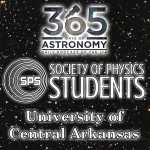Podcaster: Dr Sarah Ballard
 Title: Choose Your Own Adventure: Multiplicity of Planets among the Smallest Stars
Title: Choose Your Own Adventure: Multiplicity of Planets among the Smallest Stars
Organization: The Society of Physics Students (SPS) at The University of Central Arkansas
Link : The Society of Physics Students (SPS) at The University of Central Arkansas
Description: The Solar System furnishes the most familiar planetary architecture: many planets, orbiting nearly coplanar to one another. However, the most common planetary systems in the Milky Way orbit much smaller M dwarf stars, and these may present a very different blueprint. The Kepler data set has furnished more than 100 exoplanets orbiting stars half the mass of the sun and smaller. Half of these planets reside in systems with at least one additional planet. I investigate the proposition of self-similarity in this sample: whether a single architecture explains the multi-planet yield of Kepler. In fact, the data much prefer a model with two distinct modes of planet formation around M dwarfs, which occur in roughly equal measure. One mode is one very similar to the Solar System in terms of multiplicity and coplanarity, and the other is very dissimilar. I discuss whether stellar properties are predictive of one final architecture over the other, and describe implications in the search for life. Ultimately, the deluge of forthcoming exoplanet discoveries will require cheap observables to prioritize precious followup resources, and I’ll describe how to leverage planet multiplicity to maximize science return.
Bio: The Society of Physics Students (SPS) at The University of Central Arkansas is incorporates outreach, demonstrations, tutoring and guest speakers into our SPS Chapter.
Dr Sarah Ballard is a Torres Postdoctoral Fellow at the Massachusetts Institute of Technology and has been awarded a fellowship in the 2015 L’Oréal For Women in Science program.
Today’s sponsor: This episode of “365 Days of Astronomy” is sponsored by — no one. We still need sponsors for many days in 2016, so please consider sponsoring a day or two. Just click on the “Donate” button on the lower left side of this webpage, or contact us at signup@365daysofastronomy.org
End of podcast:
365 Days of Astronomy
=====================
The 365 Days of Astronomy Podcast is produced by Astrosphere New Media. Audio post-production by Richard Drumm. Bandwidth donated by libsyn.com and wizzard media. You may reproduce and distribute this audio for non-commercial purposes. Please consider supporting the podcast with a few dollars (or Euros!). Visit us on the web at 365DaysOfAstronomy.org or email us at info@365DaysOfAstronomy.org. This year we will celebrate more discoveries and stories from the universe. Join us and share your story. Until tomorrow! Goodbye!

